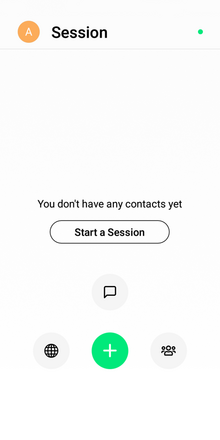Software:Session
 | |
 Screenshot of Session version 1.17.4 on Android (December 2023) | |
| Developer(s) | The Oxen Project |
|---|---|
| Initial release | February 2020 |
| Stable release(s) | |
| Repository | github |
| Operating system | |
| Type | Instant messaging |
| License | BSD-3-Clause MIT GPL-3.0 |
| Website | getsession |
Session is a cross-platform end-to-end encrypted instant messaging application emphasizing user confidentiality and anonymity. Developed by The Oxen Project under the non-profit Oxen Privacy Tech Foundation, it employs a blockchain-based decentralized network for transmission. Users can send one-to-one and group messages, including various media types such as files, voice notes, images, and videos.[3]
Session provides applications for various platforms, such as macOS, Windows, and Linux, along with mobile clients available on both iOS and Android.
Features
Session does not require a telephone number or email address for account creation. Instead, it utilizes a randomly generated 66-digit alphanumeric number for user identification. Communication between users, including messages, voice clips, photos, and files, is end-to-end encrypted using the Session protocol. Session uses the Loki blockchain network for transmissions. In 2021, an independent review by the third-party Quarkslab verified these claims.[4][5][6][7]
Development
Session started as a fork of another messenger, Signal, aiming to build upon its foundation. However, concerns about the centralized structure of Signal Protocol and potential metadata collection led the team to deviate and create their own protocol, called "Session Protocol". This approach prioritized increased anonymity and decentralization. During development, the team encountered various challenges, leading to the necessity of abandoning or modifying many features.[6][8]
Limitations
Session lacks support for two-factor authentication, and its underlying protocols are still in a developmental phase. Following the migration from the Signal Protocol to its internally developed protocol, forward secrecy and deniable authentication were not implemented.[9]
References
- ↑ "Private Messenger APKs for Android". April 8, 2021. https://www.apkmirror.com/apk/oxen-project/session-private-messenger/.
- ↑ "Private Messenger". October 31, 2023. https://session-private-messenger.en.softonic.com/iphone.
- ↑ Bhattacharjee, Shomik Sen (October 8, 2021). "Session Is a Blockchain-Based Private Messenger That Uses Decentralised Server Nodes To Ensure Anonymity" (in en). Gadgets 360. https://www.gadgets360.com/cryptocurrency/news/session-private-blockchain-messenger-decentralised-nodes-2568208.
- ↑ Ankush, Das (February 10, 2022). "8 Reasons to Try Session as a Private Messaging App" (in en-US). https://www.makeuseof.com/why-try-session-private-messenger/.
- ↑ "New WhatsApp Alternative "Session" Works Without Your Phone Number" (in en-US). March 9, 2020. https://fossbytes.com/open-source-messenger-session-doesnt-even-need-your-phone-number/.
- ↑ 6.0 6.1 "Session Messenger Review – Best Secure Messaging App?" (in en-US). https://restoreprivacy.com/secure-encrypted-messaging-apps/session/.
- ↑ Oxen Session Audit Technical Report. Quarkslab SAS. 2021. https://blog.quarkslab.com/resources/2021-05-04_audit-of-session-secure-messaging-application/20-08-Oxen-REP-v1.4.pdf. Retrieved October 11, 2021.
- ↑ Florence, Eric (January 6, 2022). "Session Messenger Review" (in en-US). https://securitytech.org/secure-encrypted-messaging-app/session/.
- ↑ "The Session Protocol: What's changing — and why - Session Private Messenger" (in en). December 16, 2020. https://getsession.org/session-protocol-explained.
External links
